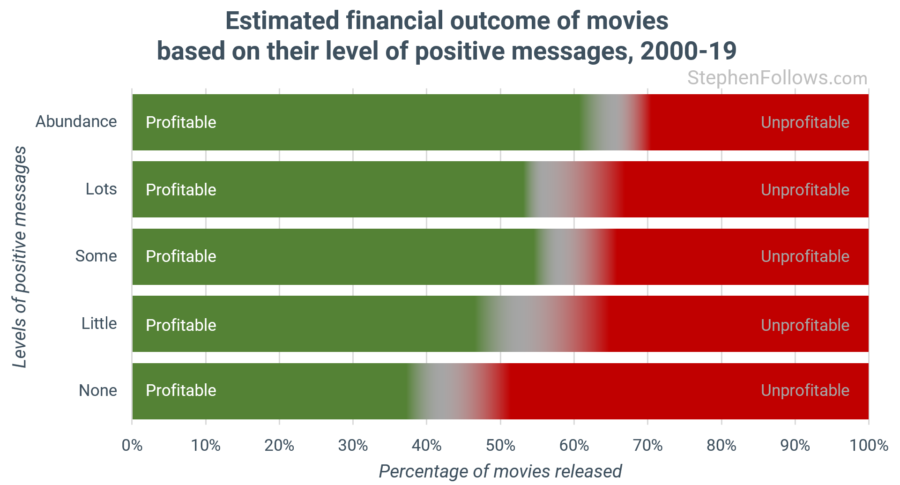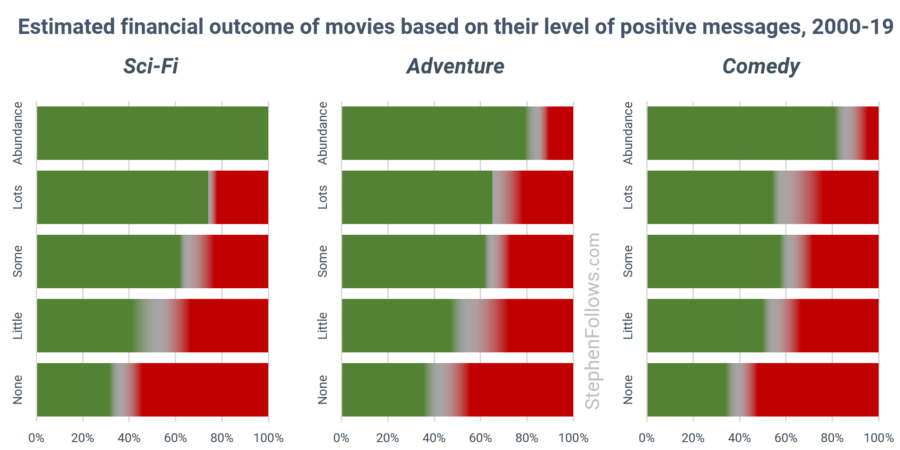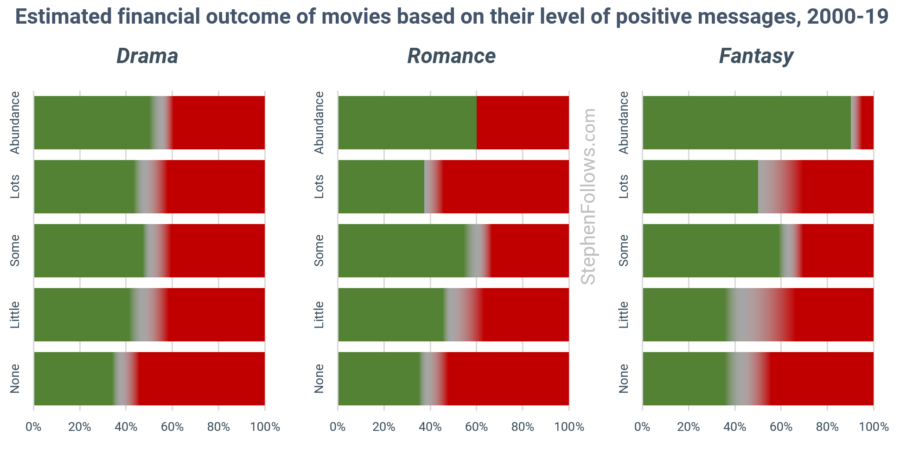One of the features I love most about movies is their ability to give us shared stories which entertain, inspire and soothe us. And in trying times, this function becomes ever more essential.
In the 1940s, musicals provided a colourful escape from war, stories of rebellion in the 1970s gave hope to audiences losing faith in political systems and modern-day superhero movies provide easy delineation between good and evil in murky times. So what will be the escapism of the 2020s?
Regular readers will know that I subscribe to MGM co-founder Samuel Goldwyn's belief that "It is difficult to make forecasts, especially about the future". Therefore, I won't pretend to know what the next decade holds for on-screen stories. But I do want to share something I found while playing around with a few of my movie datasets which I think may be relevant.
I studied the financial performance of 4,271 movies which were released in the past two decades and looked for patterns with their levels of positivity. Although positivity and positive messages are slightly nebulous concepts, we can track signals from a number of sources. For example, sites such as Common Sense Media provide breakdowns of the contents of movies to help parents make informed choices about what movies to let their children watch. There's much more detail on my data and methodology in the Notes at the end of the article.
Do films with positive messages make more money than those without?
Let's start with the overall result and then break it down by genre.
I used a mix of real-world data and algorithmic estimation of financial performance to look at the likelihood each movie was profitable. This calculates whether each film's total income from all sources is likely to have outstripped its total expenditure associated with making and distributing the movie. This method results in a degree of uncertainty so in the charts below I have added a colour gradation between the two ends of the spectrum (i.e. "Profitable" or "Unprofitable").
The charts below show the headline result. Across movies of all types, those with higher levels of positive messages are more likely to be profitable than those with less or no positive messages.
Which genres have the strongest link between positivity and profitability?
I have picked out three genres which seem to have the strongest connection between the two factors, namely Sci-fi, Adventure and Comedy.
It's worth remembering that some genres are more frequently made than others, and also that the more we subdivide our categories, the greater chance we have of extreme results. For example, in the chart above, the Sci-Fi data relates to 492 movies but there are only a handful of "Sci-fi movies with an abundance of positive messages." Therefore, if many more extremely positive sci-fi movies were made, I doubt it would maintain its "100% profitable" result.
Which genres have the weakest link between positivity and profitability?
I could not find any genres in which the headline result was reversed, not even horror. That said, some genres seem to have a much more mixed result. The least likely to follow the "positivity equals profits" rule of thumb were drama, romance and fantasy.
If you would like to read more above movie profitability then you may enjoy these past pieces of research:
Notes
The data for today’s research came from Common Sense Media, Dove, MPAA, BBFC, IMDb, OpusData and Wikipedia. It includes all feature films released in US cinemas between 2000 and 2019 for which a budget and box office data was available.
It’s worth stating the obvious that measuring the amount of positivity in a movie is subjective. It’s not possible to truly track an exact, unbiased level of content in a movie without many reviewers watching the same movie and having an objective standard for scoring. That said, the sources I used have clear guidelines as well as experienced reviewers who justified their scores and based them on a shared criteria. In the absence of a better measure of a movie’s content, this works well enough for the function needed in today’s research.
Profitability is also something which is hard to research, but for a different reason. While there is an objective truth to the costs and income of a movie, we have a hard time finding it out. Today's research uses a mix of real-world data and calculations, based on standard industry practice. This is getting harder to do as more of a film's value chain comes from the hidden worlds of VOD and digital sales, compared to the relatively transparent world of cinema admissions.
We’re measuring correlation, not causation. This means that we don't know to what extent the positive messages are leading to the financial outcome or if there are other linked forces at play.
Epilogue
Today's article sprung from a research dead-end. I thought I'd share the original idea to see if readers could help suggest next steps...
My wife and I have been re-watching various movies we remember from our teenage years and after a particularly explosive double bill (Demolition Man and The Running Man) I started to think about utopian versus dystopian Sci-fi movies.
I formed a couple of theories to test:
That there are many more dystopian sci-fi movies than utopian ones. I'm reasonably sure this is the case, but of course, we can never know until we crunch the numbers.
Utopian sci-fi movies are more successful than dystopian ones. This is more of a reach and might just be something I want to be true, rather than the actual truth!
However, in trying to conduct this research, I ran into two major problems:
Who's asking? The term 'utopian' refers to a world in which everything is perfect; a world beyond hardship, prejudice, injustice, etc. These are somewhat subjective terms and so utopia is in the eye of the beholder. The vast majority of people in Brave New World would consider their world to be utopian. However, as the book is told from the perspective of dissidents, we view it as oppressive and controlling. Likewise, the Wakandans in Black Panther, the Eloi in The Time Machine and the Borg in Star Trek may regard themselves as living in a utopian world/civilisation (certainly when compared to dystopian visions such as that shown in Blade Runner).
What's happening? Movies are about conflict - things need to happen, people need to overcome adversity and have something to strive for/against. Therefore, a story in a truly utopian world would be 90 minutes of people eating grapes. There must be trouble in paradise, and given the tropes of movie hero/ines, it's likely that our main protagonists will reveal some nature of the utopia to be illusionary.
So I couldn't think of a path forward for the research. If any of you can help, please do get in touch.





